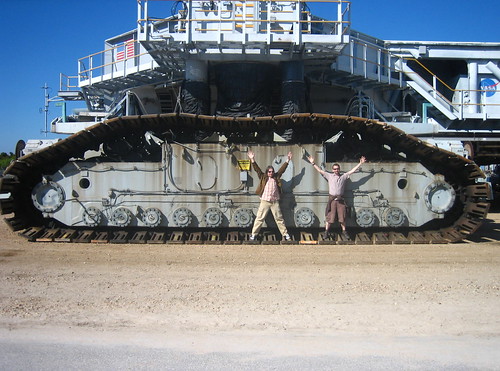And the ocean goes deeper than 20m. A lot deeper. The average depth of the ocean is estimated to be around 3,800m. The deepest point is 11,034m below the surface.
Using the basic math outlined above, that's 1,103x more pressure you're used to. That's about 1,150kgs per centimetre². To put that into perspective, a centimetre² is about the size of a fingernail, and 1,150kgs would be an unusually large Clydesdale horse.
Given a chest area of 40cm x 70cm, that's 2,800cm². Which means you've got over 3,000,000kgs of pressure on your chest. Or 3,000tonnes. Large horses aren't a useful measurement here, so let's go bigger. A large blue whale could weigh as much as 150tonnes, so that's 20 (large) blue whales. Man, even that's hard to picture. What can I find that's equal to 3,000tonnes?
Well, I couldn't find anything in a quick search, but I did find NASA's Crawler Transporter, which clocks in at 2,700tonnes, which is reasonably close and totally illustrative. It's the world's largest self-powered land-based vehicle (beaten by both vehicles not self-powered and by sea-based vehicles in terms of size).
Here's a picture of two people standing on one of the Crawler's treads, to put those in perspective:
Now, here's a picture of the full Crawler:
(click to embiggen)
And here it is, doing what it's built to do:
(click to embiggen)
So, if you somehow find yourself at the very deepest depths of the ocean, it would feel a lot like having the vehicle that moves the space shuttle (and the launch platform at the same time) sitting on your chest.
Sources
Wikiepedia entry on cm²
Marinebio.org ocean facts
Discover Magazine article on deep sea animals
International Society for Photogrammetry and Remote Sensing article about... not sure, but it gave surface area for a chest
American Cetacean Society Blue Whale Fact Sheet
Wikipedia article on Clydesdale horses
Adactio's flicker account
Wikipedia article on the Crawler Transporter



No comments:
Post a Comment